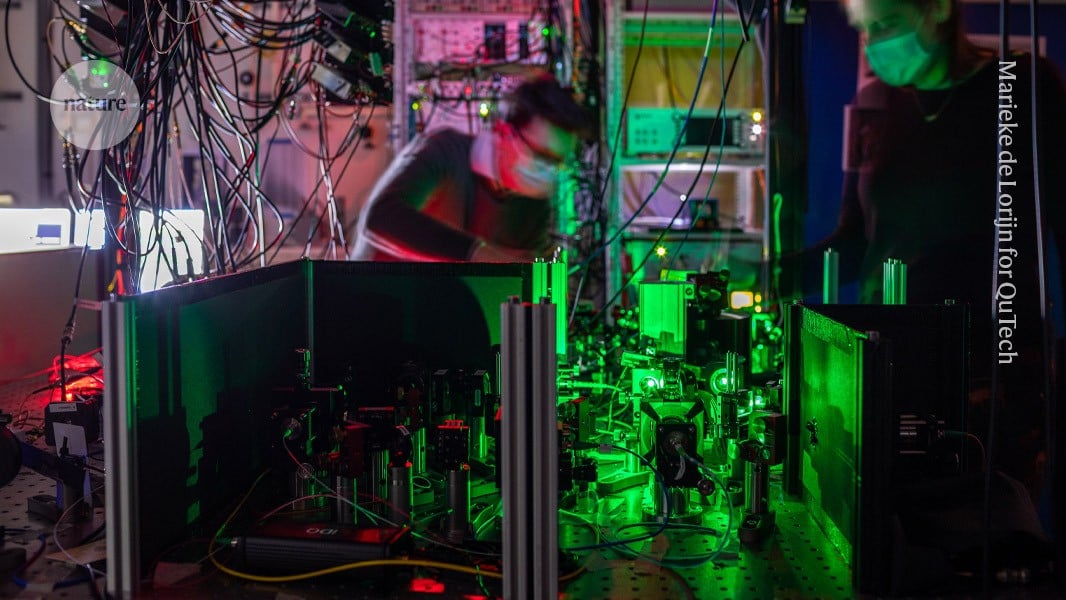Experiments generate quantum entanglement over optical fibres across three real cities, marking progress towards networks that could have revolutionary applications.
Can’t wait until the Internet consortium tells Comcast they can’t use another misleading name
It pisses me off that they’re calling quantum data transmission quantum entanglement, it’s not the same thing and it’s misleading as fuck.
Quantum entanglement is about two quantum particles sharing the same state which if implemented somehow would allow for universal communication with no time lag. Sending quantum state communication through fiber optic, while an achievement for distributed quantum computing, is not quantum entanglement!!
Man, reading the title I thought quantum entanglement had finally arrived and I clicked that shit so fast 😂
Quantum entanglement communications also have fundamental problems that will likely render them effectively unusable. You need a key to decrypt anything you send, and the key has to travel no faster than c. It’s impossible to tell the data from the noise without the key. Attempting to read the data or to change the data being sent also collapses the effect, which can only be fixed by bringing the two systems together. In short, you can only send a single packet of data and you can’t use it without a key transmitted using traditional methods.
Can that be scaled? c is still better than rotting cables.
The limit is c because you have to use cables, radio, or other traditional methods to send the key. The data in the entangled pair would also have to be set at the time the two devices are constructed, so that’s not super useful. It might be useful for single use authentication, but that’s about it.
Don’t think of entanglement as being like one object in two spots. Think of it like identical twins. One twin getting a hair cut does nothing to the other twin’s hair. Similarly, altering a property of one entangled particle does nothing to the other and actually means they are no longer entangled or identical.
Oh that’s really helpful thanks for the clarification
No problem. I was pretty disappointed when I learned all the sci-fi writers were getting it wrong. Though, to be fair, it really should be called something else.
Yeah that’s exactly what I was comparing it too.
Meanwhile, in rural areas, dialup is still a thing.
Quantum Dial-up. We just charge you an extra $60 a month and you get nothing in return other than a cool name.
Great deal. Thanks, marketing!
And companies will charge 2x what fiber costs because “quantum Internet”.
Oh boy, I can’t wait entangled ads everywhere!
It’ll be even more awesome when they add entangled AI to everything
Oh no. And even worse Internet of Everything
A quantum internet could enable any two users to establish almost unbreakable cryptographic keys to protect sensitive information
We can already do that dumbass.
Ah, finally. Now we will stop talking about, hearing about, and shoving “AI” in everything and the next new thing will be “quantum internet enabled” things.
I guess that’s far more unbreakable than what we have. But anyway, several three letter agencies will fight this (again) tooth and nails.
This will be useful for militaries and corporations, not consumers. If it can’t work anywhere (or over a VPN, or wirelessly, etc.) It won’t work.
Your statement isn’t terribly we informed
I’m sorry. I realized in a comment below that one its very useful for governments/militaries and corporations.
I mean they’re not wrong, we already have encryption algorithms resistant to quantumn computers.
That’s not what the article was about
A very useful video that explains what Quantum Internet is… and what it isn’t:
https://www.youtube.com/watch?v=u-j8nGvYMA8
TL/DW: A big misconception here has to do with Quantum entanglement. Quantum Entanglement in Quantum Internet doesn’t mean that you can transfer data at speeds faster than light.
It’s true that this connection would be “ultra secure” but this would be very inefficient (slow) and it wouldn’t be reliable in a noisy environment. It would probably be most useful for some sort of authentication protocol/key sharing.
Here is an alternative Piped link(s):
https://www.piped.video/watch?v=u-j8nGvYMA8
Piped is a privacy-respecting open-source alternative frontend to YouTube.
I’m open-source; check me out at GitHub.
“Almost unbreakable keys” - I’m not up to speed on what this race entails, relative to the current state of affairs. Does “almost” mean “any gov agency w/ a budget and quantum computers” can break it, it is it an actual step forward from the status quo?
A question worth asking, in context of article.
There’s not a ton of stuff I demand to be secure, full stop, but SSH and comms w/ my wife are among them. I need to dive deeper, and understand the actual risks.









